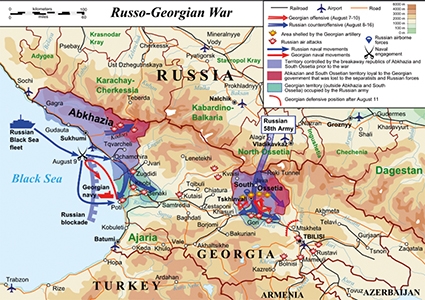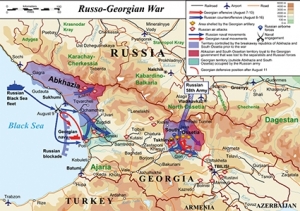August 2008 War: Consequences of a Blitzkrieg
Georgia, Russia, Abkhazia and "South Ossetia", each bears a share of the responsibility in the outbreak of hostilities. But each has become a victim of it. Since 2008, all the August War belligerents have suffered from the bloody and destructive conflict. Let us take a look at the consequences.
The breakaway Tskhinvali region
There is no doubt that so-called South Ossetia has been the main loser of the August War. According to George Mchedlishvili, an Academy Associate at the Chatham House think tank, the main consequences of the conflict have been the collapse of the economy. Now, the breakaway region mostly relies on financial support from Russia. However, the local population does not see any of that money, which is misappropriated though corruption while more than half the population lives on less than GEL 6 per day. The war was a recipe for economic disaster, but not only. So-called South Ossetia is going through another crisis: depopulation. The ethnic rivalry which was a problem before, leading to expropriations and insecurity, is no longer the number one issue. Many natives, Ossetian people, have migrated to North Ossetia which is an official part of the Russian Federation, there establishing new settlements in the historic territory of the Ingush. Tensions are expected. The so-called South Ossetia also remains insecure while Georgian citizens are kidnapped or attacked on a regular basis.
The de facto Republic of Abkhazia
The situation is considerably more positive in the Abkhazia region. In terms of economy, the potential is high, as the territory is rich in natural resources and is well-located near the sea. Politically, contrary to “South Ossetia,” the political life is developed, and one can see an opposition and debates. The ethnic relations with Adigeys, Kabardins, and Circassian inside the de facto republic seem to be good, with the exception of the Georgian natives. Taking the positive situation into account, the de facto Republic does not desire to join the Russian Federation and expects recognition as a UN-member state in the coming years. This will never happen while the “authorities” discriminate and enforce laws against the Georgian people. A UN report said that as long as the 200,000 Georgians who were forced to flee are unable to return to their homes, any referendum will be considered illegal. The de facto republic is also facing a rural exodus from the Abkhaz-speaking countryside to cities, where Russian is mostly spoken.
The Russian Federation
Russia showed that it could violate international law by invading other countries. The “support” to South Ossetia was beyond the limits of legality and Russia has shown itself a liar which thinks nothing of breaking official agreements. Therefore, Russia lost in credibility. Perhaps the lack of international reactions ultimately encouraged Russia to do the same again in Ukraine and Crimea.
State-administrated Georgia
Georgia has suffered from the 2008 August War regarding its international relations and domestic policy. First, the EU-backed report released in 2009 blamed Georgia for starting the five-day war with Russia but said also that Moscow’s military response violated international law. This report may have affected Georgia's international relations and delayed EU negotiations somewhat, although the conflict turned the majority of Georgians away from Russia and towards the European Union, with whom the country signed an Association Agreement in 2014. The main consequences deal with domestic policy. “Because of discontent about how the war was handled, the Georgian leadership became far more intolerant towards any dissent, on the pretext they had to protect the security of the country (…) It weakened and pretty much eviscerated any political dialogue and opposition became marginalized (…) anyone who criticized Saakashvili’s government was accused of being a Russian agent,” said Mchedlishvili.
By Antoine Dewaest












